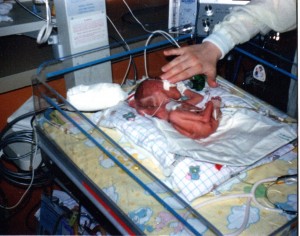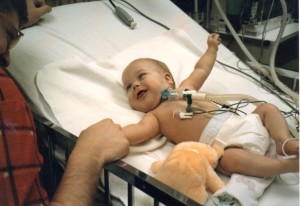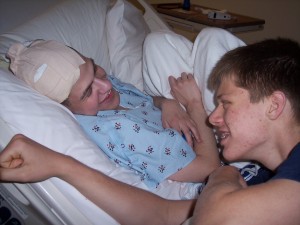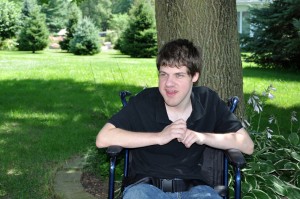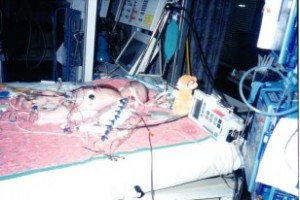-
Providing care does not mean you care
What Kind of Doctor Do You Want To Be?
September 16, 2011In all our experiences over the years, we have seen two types of doctors, doctors who provide care and doctors who truly care. You might think they are one and the same, but you’d be mistaken. As a doctor, you might become very knowledgeable about your particular specialty. You may be able to look at a laundry list of conditions and tell exactly what my son has. You might be able to quote figures and percentages and tell me what the odds are that my son will ever walk or talk. I will tell you though that my son is not hydrocephalus. My son is not cerebral palsy. My son is not the numerous other labels that have been placed on him. If when you look at him, that is all you can see, you might be able to provide care but you won’t care.
Edward Albert once said the simple act of caring is heroic. You might not think that it is heroic to care, but I tell you it is. Picture this:
A mother, standing at the bedside, wearing scrubs because she hasn’t had time to take a shower let alone drive home to get clothes. Her son is hospitalized, again, she’s tired, worried, worn out and afraid. The neurosurgeon walks into the room and looks at her son.
“How is he upstairs?” He asks.
The mother, who is rightly confused asks, “What?”
“You know,” he says, “how is he mentally?”
“What difference does that make?” she asks.
“Well, it just does.”
Nurses, who have been watching the whole thing unfold, are horrified by what they hear. The nurses take the shaking, visibly upset mother out of the room. Since this doctor is the neurosurgeon on call, she has to entrust her sons care him. She doesn’t have a choice. Her son needs surgery and he needs it now. She cries and worries that maybe the doctor won’t care. Maybe he won’t try as hard. Maybe he’ll just let her son go after she has fought so hard to keep him alive.
When her son comes out of surgery, this neurosurgeon comes into the empty waiting room. At the same time he sees the parents, he hears the t.v., which is blaring the Olympics. He turns away from the parents and watches what is happening on the t.v. When they ask how their son is doing, he holds up his hand to shush them until he sees the race finish. He treats them as if they don’t matter.
Compare this to the neurologist who knows how much she cares for her son because he’s spent time at her bedside. He’s taken the time to come visit with them when her son wasn’t in pain. He’s visited when her son wasn’t so sick he couldn’t even stay awake. He has seen him watch Price is Right. He has seen him laugh out loud. He has seen the love they share. This is the neurologist who holds her hand while she makes the calls, once again to her family. This is the doctor who offers to make the calls himself. This is the man she will remember fondly for the rest of her life because he took the time to care about her son.
To her this doctor is a hero, as are the other physicians and nurses who took the time to care about her child. I could sit and list all the things that were done wrong. The list, which is unfortunately long, would include the care that caused my son’s severe brain damage. I could talk about the care that wasn’t given in a timely manner. I could talk about all the times I cried because the doctor wouldn’t listen. But today I’m going to talk about the positives, the people that showed how much they care.
There was a doctor who made the resident cross out all the times this resident listed mental retardation in my son’s chart because Codey wasn’t old enough for that diagnosis and our doctor didn’t want Codey labeled with something we weren’t sure about yet. Did it matter in the long run? No. Did he show he cared? Yes.
I can talk about the pediatrician that took the time to sit on the floor during my son’s first routine visit and just play with him. She tried to overcome Codey’s severe anxiety over anyone in a white coat who came near him. She spent precious time just playing with him on the floor. Would you say she cared?
I can talk about the nurse who rode with my son to Iowa City to get his trach because they wouldn’t allow family in the ambulance. This same nurse sends birthday cards 24 years later. This nurse has attended my other children’s graduation parties. I realize this level of care isn’t always possible but it has been a blessing to our family.
I can talk about the nurses who bought my son a regular crib with their own money and decorated it with Christmas lights because he had been in the NICU for 8 months. The same nurses treated us like family.
I can talk about the doctor who was honest enough to admit that if he tried to trach Codey, he might kill him. This doctor recommended we go to Iowa City where they had more experience. You might think that is wrong to admit that you can’t or don’t know something. I tell you, it is honorable. It is the right thing to do. It will earn you that parent’s trust because you proved you care more about the patient’s life than your ego.
The reality is you may be very, very bright and be a wonderful technician, but if you don’t look like you care, the parent’s won’t trust you. All it takes is a hand held, a moment to show that you care. It can be something as simple as remembering the patient’s name and taking the time to directly speak to them.
Our daughter, Hope, has a complicated heart defect called, hypoplastic left heart syndrome. Hope had a cardiologist that we have known for years. Every time we came into the appointment, we felt like we were catching him up. It was frustrating because we never felt like he put any thought into her care. We always felt like he was seeing just one frame in the whole movie. He provided competent care, but did he truly care?
Compare that to Hope’s new cardiologist. Before we even had our first appointment, he took her chart to present at a cardiology conference. Hope had a pulmonary stent that had cracked and he was unsure what the best course of action would be. He presented her case and got advice from 100’s of doctors before she was even truly his patient.
Both cardiologists were bright. Both knew what they were talking about. Who do you think we trusted more? Who showed that they cared?
If you want to make a difference you need to care and not just provide care. You need to take the time to get to know your patients. That textbook won’t tell you who that patient is or who their family is. You will never know that patient better than their parents do. Don’t talk down to the parent that spends 24 hours a day with this child. The patient is not their condition. My son is not the shunt case in bed 3. He has a name and many, many people who love him.
I know that your days are packed with people to care for. I know that sometimes the cases are sad and overwhelming. I know that sometimes it just doesn’t seem worth it to go that extra mile. I know that the hours are long and the overnight care get tedious, but with all that being said, you really need to consider if you want to be the person families remember with fondness or the person they wish they could forget?
Be a hero. This isn’t something you can fake. You either care or you don’t. If you don’t care, maybe you shouldn’t be in medicine. On the other hand, if you take the time to know the patient and support the parents and truly give of yourself – your time, your support, your caring – well, then you might just be someone’s hero.

